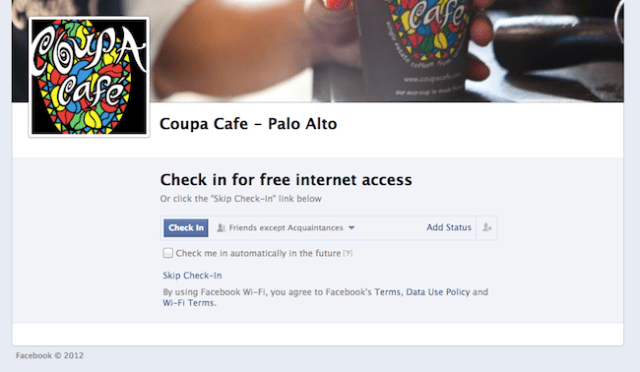Restaurants, hotels, and other businesses are spending a lot to provide customers with free Wi-Fi. Today Facebook and Cisco roll out a way to help any brick-and-mortar recoup its costs by asking users to check-in to get Internet access. Those who oblige get dropped on the business' Facebook Page, and their anonymous, aggregate demographic info is passed to the merchant.
The Cisco and Facebook partnership extends a pilot of "Facebook Wi-Fi" that began running with 25 businesses in the San Francisco Bay Area last year. The test showed that businesses tripled their daily check-in count by using the system. Now it's rolling out so any business in the US can use it.
Here's how it works. Merchants use the existing router and broadband subscription they pay for. They integrate the "Cisco CMX for Facebook Wi-Fi" software, which creates a special landing page for anyone trying to access the business' Wi-Fi.
Instead of having to wait in line to get a password they might type in wrong, customers simply connect to the business' Wi-Fi network through their laptop or mobile device. They're strongly encouraged to "Check in for free Internet." That check-in generates a News Feed story shown to their friends, bringing extra business to the merchant. Once connected without having to type in a password, users are dumped on the business' Facebook Page where they can Like it or see recent marketing messages. Facebook also provides the merchant with the aggregate ages, genders, and other demographic info of those who check in, but in an anonymized format without names attached.
That check-in generates a News Feed story shown to their friends, bringing extra business to the merchant. Once connected without having to type in a password, users are dumped on the business' Facebook Page where they can Like it or see recent marketing messages. Facebook also provides the merchant with the aggregate ages, genders, and other demographic info of those who check in, but in an anonymized format without names attached.
Say a user doesn't want to share their location. The head of Facebook's Wi-Fi initiative Eric Tseng tells me they can make the check-in private "if they don't want to spam friends." And if customers don't have a Facebook account at all or are a little paranoid…and have good eyesight, they'll find a small link at the bottom the landing page to connect without Facebook.
Tseng sees the program as a win for everyone involved. Customers get easy Wi-Fi access without fumbling with a password. Businesses get word-of-mouth marketing, Facebook engagement, and analytics that justify the cost of providing Wi-Fi, and Cisco gets its name out there.
Facebook gets a ton out of the program, too, including:
- Check-ins to show in its News Feed besides ads
- Information about the locations and businesses its users visit
- A foothold with merchants it wants to turn into advertisers
- Recommendations of businesses to enrich Graph Search and its Nearby local discovery feature
If the Facebook Wi-Fi program gains steam, it could be easier to find an Internet connection around town since offering it won't be such a costly burden to businesses. Unfortunately, less savvy users might not realize they don't have to broadcast their current coordinates to get hooked up. Some people might actually enjoy helping friends discover cool cafes by checking in. But for everyone else, just read the gray print and the web is yours, no strings attached.
Facebook is the world's largest social network, with over 1.15 billion monthly active users. Facebook was founded by Mark Zuckerberg in February 2004, initially as an exclusive network for Harvard students. It was a huge hit: in 2 weeks, half of the schools in the Boston area began demanding a Facebook network. Zuckerberg immediately recruited his friends Dustin Moskovitz, Chris Hughes, and Eduardo Saverin to help build Facebook, and within four months, Facebook added 30 more college networks. The original...
Cisco designs and sells hardware, software, networking, and communications technology services. Products are distributed under five brands, namely Cisco, Linksys, WebEx, IronPort, and Scientific Atlanta. Cisco was founded in 1984 by a small group of computer scientists from Stanford University. Since the company's inception, Cisco engineers have been leaders in the development of Internet Protocol (IP)-based networking technologies. Cisco name is based on its origins starting up in San Francisco.
No hay comentarios:
Publicar un comentario